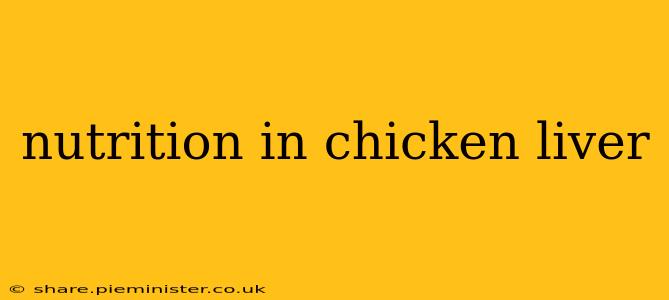Chicken liver, often overlooked, is a nutritional powerhouse packed with essential vitamins, minerals, and other vital nutrients. While some might shy away from its distinctive taste and texture, understanding its nutritional profile reveals a food that offers significant health benefits. This comprehensive guide delves into the nutritional composition of chicken liver, addressing common questions and concerns surrounding its consumption.
What are the nutritional benefits of chicken liver?
Chicken liver boasts an impressive nutrient density. It's an excellent source of high-quality protein, crucial for building and repairing tissues. Furthermore, it's exceptionally rich in several vitamins and minerals, including:
- Vitamin A: Chicken liver is incredibly high in Vitamin A, exceeding the recommended daily intake in just a small serving. Vitamin A is essential for vision, immune function, and cell growth.
- Vitamin B12: A crucial vitamin for nerve function and red blood cell formation, chicken liver provides a significant amount of Vitamin B12, often deficient in vegetarian and vegan diets.
- Iron: A vital component of hemoglobin, iron carries oxygen throughout the body. Chicken liver is an excellent source of heme iron, a form more readily absorbed by the body than non-heme iron found in plant-based foods. This makes it particularly beneficial for individuals prone to iron deficiency anemia.
- Copper: This essential mineral plays a role in energy production, iron metabolism, and nerve function. Chicken liver contains a substantial amount of copper.
- Selenium: A powerful antioxidant, selenium protects cells from damage caused by free radicals. Chicken liver is a rich source of this vital trace mineral.
- Folate: Important for cell growth and development, especially during pregnancy, folate is another nutrient found in abundance in chicken liver.
Is chicken liver high in cholesterol?
Yes, chicken liver is high in cholesterol. This is a common concern among health-conscious individuals. While dietary cholesterol's impact on blood cholesterol levels is less significant than previously believed, individuals with high cholesterol should still consume chicken liver in moderation as part of a balanced diet. Consulting a doctor or registered dietitian is advisable for personalized dietary advice.
How much chicken liver should I eat per week?
There isn't a universally recommended amount of chicken liver consumption per week. Moderation is key. A serving size of around 3 ounces (approximately 85 grams) is a reasonable starting point. Remember to incorporate it into a balanced diet rich in fruits, vegetables, and whole grains. Overconsumption of chicken liver, due to its high cholesterol and vitamin A content, is not recommended.
What are the potential downsides of eating chicken liver?
While chicken liver is incredibly nutritious, there are some potential downsides to consider:
- High Cholesterol: As mentioned earlier, it's high in cholesterol.
- High Vitamin A: Excessive Vitamin A can be toxic. Moderation is crucial.
- Potential for Contaminants: Like other organ meats, chicken liver can potentially contain higher levels of certain contaminants compared to muscle meat. Choosing high-quality, ethically sourced chicken liver from reputable suppliers can minimize this risk.
Can I eat chicken liver if I'm pregnant?
Chicken liver offers benefits during pregnancy due to its high folate content, crucial for fetal development. However, the high Vitamin A content necessitates moderation. Pregnant women should consult their healthcare provider for personalized dietary advice regarding chicken liver consumption.
Is chicken liver good for weight loss?
Chicken liver can be part of a healthy weight-loss diet due to its high protein content, which promotes satiety (feeling full). However, its high calorie and fat content mean moderation is essential. It shouldn't be considered a weight-loss superfood on its own.
How can I prepare chicken liver healthily?
There are many ways to prepare chicken liver, including pan-frying, sautéing, and even adding it to stews or pâté. Opt for healthier cooking methods like baking or grilling to reduce fat. Avoid excessive oil or butter.
In conclusion, chicken liver, when consumed in moderation, is a nutritional powerhouse offering a wide range of essential vitamins and minerals. While its high cholesterol and Vitamin A content necessitate mindful consumption, its health benefits make it a valuable addition to a balanced diet for most individuals. Always consult with a healthcare professional or registered dietitian to determine if it's appropriate for your specific dietary needs and health conditions.
